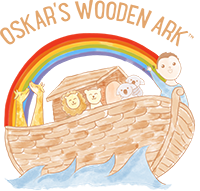
Shop and Learn with Erzi Play Food
An #Oskarslittlelearners Activity Tutorial by Kate Kwijas, for Oskar's Wooden Ark
May 05, 2021
'Playing Shop' is a wonderful imaginary play and learning activity for parents and children to enjoy together. Help your little ones develop social skills, provide them with opportunities for problem solving, assist in language development and introduce them to early Maths concepts. In this tutorial, Kate shows us how to set up shop with Erzi wooden play food, complete with free printable price tags. Happy shopping!
Will you try this activity with your little learners? Don't forget to share your learning with us on Instagram and Facebook, tagging @oskarswoodenark and using the hashtag: #oskarslittlelearners. We'd love to see what you get up to!

Preparation:
Print out the price tags (template provided), cut out and attach them to the containers you will present different items in. If you’d like the price tags to last longer, laminate them.
Free Printable Price TagsStep 1:
Set up shop. We used food items from the wonderful Erzi range, but you can sell anything you'd like!


Step 2:
Play with your little learner, facilitating their learning by asking questions or directing play to provoke learning about your chosen outcome.
Step 3:
Have fun, laugh and smile. And as always, remember that “Children need the freedom and time to play. Play is not a luxury. Play is a necessity.” (Kay Redfield Jamison)


Benefits and Learning Outcomes:
The benefits of 'Playing Shop' with your children are vast. The imaginary play involved provides opportunities for children to act out and make sense of the world around them. It can help to develop social skills (negotiation, taking turns, sharing) and provides opportunities for problem solving.
Playing shops can assist in language development, particularly listening and spoken language skills. It can also provide natural opportunities to practice an additional (or second) language.


Playing shops introduces children to the concept of money, value and trading. With early learners, it can be a good idea to begin with informal currency. You can do this by using Grapat coins to represent one dollar. However, you could just as easily use counters, buttons or acorns you found on a walk together. Other mathematical concepts covered easily within a game of Shops include; counting (with one to one correspondence, addition, subtraction, categorising, weighing and comparing objects and quantities.
What will you focus on when next you play shops with your little learners?


























